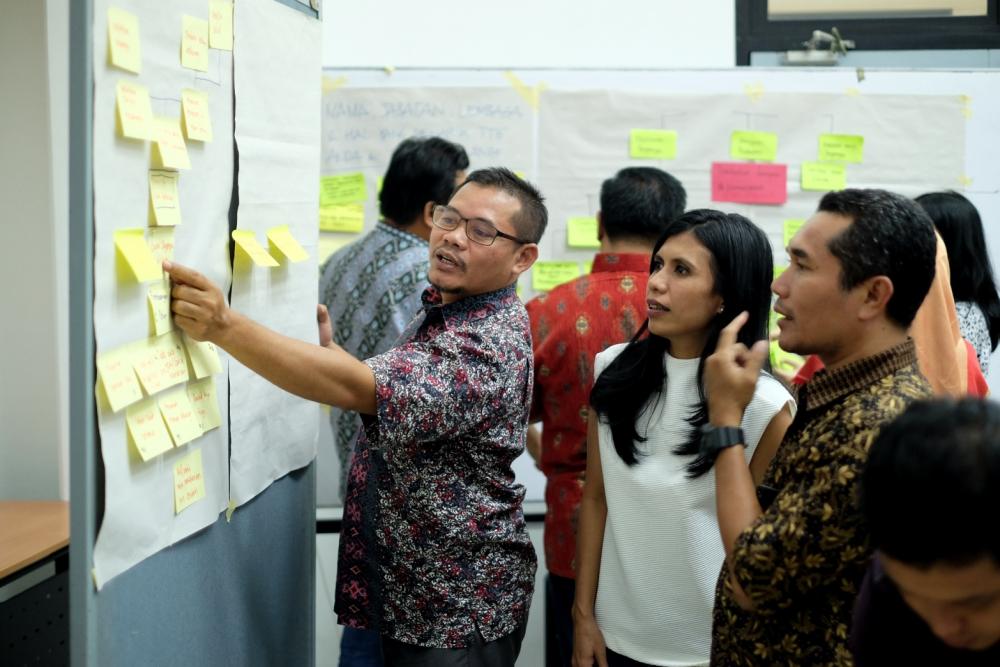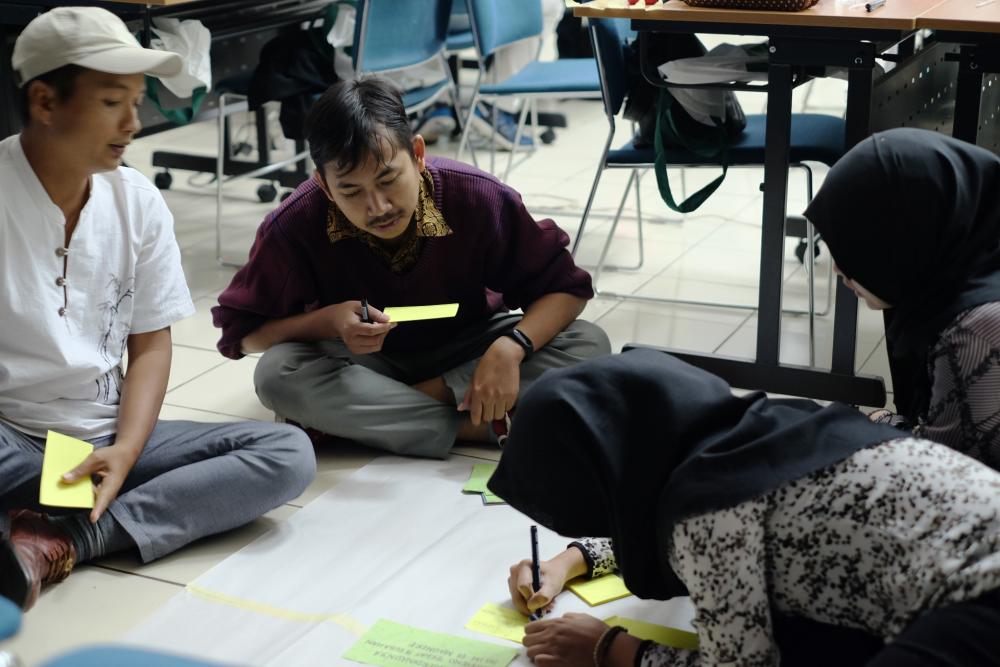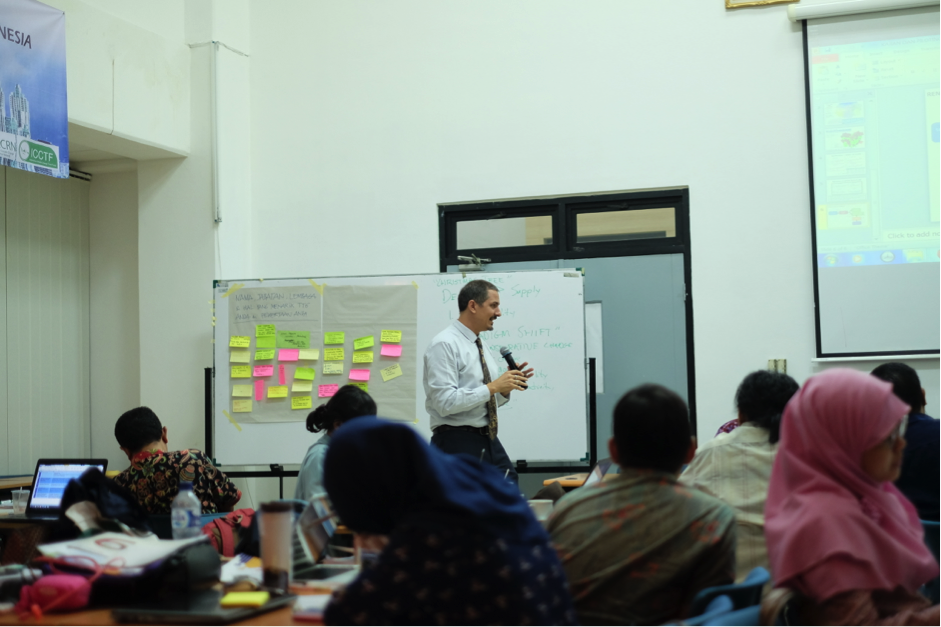Between 17-21 April 2017, a workshop entitled “Preparing Urban Climate Change Adaptation Project Proposal in Indonesia: A Project Development Workshop” was held in Bandung, Indonesia. This workshop was designed to help participants develop and improve proposals for urban climate change adaptation projects.
The workshop’s primary objective was working with existing project proposals from Call for Proposal 2015 and 2016 related to urban adaptation, and those that had not passed through ICCTF selection, and so help participants improve their proposals to meet the expectations of project financiers. They worked on their existing project concepts/proposals, refining them throughout the workshop and discussing them with experienced project professionals from USAID Adapt Asia-Pacific, ACCCRN (Asian Cities Climate Change Resilience Network), ITB (Institut Teknologi Bandung) and ICCTF (Indonesia Climate Change Trust Fund).
The target audience of this course was any agency, institution, or organization that has developed, is currently developing, or intends to develop an urban climate change adaptation project for the ICCTF or other national level financiers.
“We hope all organizations that participated in the workshop can produce a well-developed proposal and enable them to receive funding in climate change action,” said Ni Komang Widiani, Planning, Monitoring and Evaluation Manager of ICCTF.
Dr. Keith Bettinger, Team Leader for Capacity Building for the USAID Adapt-Asia Pacific Project mentioned the gap between the high demand for climate change adaptation action and the limited supply of funding. Therefore, donors or funders are very picky in distributing their funds for CCA proposals.
“We should be able to point out several things that can attract donors to consider our proposal. Firstly, there is the sustainability of impact, or how the project goes beyond the project timeline. Secondly, although it is difficult, it is better if a project can trigger a paradigm shift or transformative change, for example in community behavior, a governance process, or it addresses drivers of vulnerability, catalyzes private sector activity, and so on. And thirdly, evidence-based projects are better: what is the evidence that our project is responding to impact of climate change? How is the problem really related to climate change?” said Keith explaining several things to consider in developing a proposal.
The topics discussed during the workshop included:
- Climate finance: roles of public and private sector funds and making the case for your project
- Climate change processes and impacts: obtaining and using data and information to support your project, and describing impacts
- Administrative context of climate change in Indonesia: understanding the legal and institutional context for climate change adaptation
- Identifying and describing the problem: using problem/objective tree analysis to develop a complete understanding of the adaptation problem
- Understanding existing policies and frameworks: how to harmonize your project with local spatial and strategic development plans
- Resilience options: understanding and learning from strategies that have worked elsewhere
- Logical frameworks: developing a workable project logic
- Budgeting: how to develop a budget for your project
- Economic analysis: how to make the case that your project is cost-effective and a good use of public funds
- Social and environmental safeguards and gender considerations
- Implementation arrangements: how to coordinate the various stakeholders involved in your project’s implementation
- Monitoring and evaluation: how to develop a rigorous framework for your project that conforms to ICCTF standards.
One of the highlights of the workshop was building participants’ capacity in understanding the the difference between a business-as-usual development project with climate change adaptation project. Series of sessions were delivered to exploring how project can contribute to building climate change resilience. It is important to have a proper understanding of the vulnerability and climate change impacts happening in the city so that the proposed project can be a response to the identified risks and impacts.
Amin Budiarjo from USAID emphasized during his opening speech, “If we are creating a proposal for climate change adaptation initiative, then we should be clear on what climate vulnerability, hazard, and risk that we want to address. We should ask ourselves, resilience to what?” said Amin.
Ratri Sutarto, Mercy Corps Indonesia Director for ACCCRN added, “Climate change adaptation should be contextual to what the city needs, and responding to climate change impacts needs participation from many stakeholders, not only relying on the government’s capacity, but also that of NGOs, universities, and others to create stronger efforts in building resilience.”
. Wilmar Salim from Bandung Institute of Technology (ITB) recommended that the participants read more materials to expand their knowledge on climate change adaptation, for example a publication from IPCC, ‘Managing the Risk of Extreme Events and Disasters to Advance Climate Change Adaptation’. The report focuses on the relationship between climate change and extreme weather and climate events, the impacts of such events, and the strategies to manage the associated risks.
The workshop, through group activities, provided guidance to participants particularly on improving the logical framework which is the key part of a proposal. The workshop consisted of 15 sessions, each of which focused on developing and strengthening specific aspects of a climate change adaptation project. There were 29 participants and 3 observers from 19 organizations.
All participants attended the workshop sessions, as well as group assignments/presentations. During breakout sessions, participants were divided into several groups where they worked together to do assignments. These group assignments focused on preparing problem tree/objective trees, formulating logical frameworks, and then presentations by selected groups followed by discussions led by the facilitators. Due to limited time, a full proposal could not be prepared; but participants came to understand how to prepare a project proposal properly.


Way forward:
At the end of the workshop, the participants could see how important it was to have a database of information on funding agencies, such as which institutions fund climate change adaptation projects along with their requirements. In addition, they also knew that it was essential to create a network between participants, to establish tools for sharing information on lessons learned and best practices from the implementation of climate change adaptation projects . Furthermore, the participants hoped that USAID ADAPT Asia-Pacific, ICCTF, ACCCRN and ITB would collaborate to establish funding information for climate change adaptation, which can be accessed by the workshop participants.
The participants expected that USAID ADAPT Asia-Pacific and ICCTF could catalyse and bridge the proposals developed by the participants and communicate with the donor agencies about the proposal. The participants were also aware of the idea that it is possible to establish a project consortium in order to implement bigger projects collectively in the future.
With regard to the previous suggestion, one participant mentioned that it was worth considering establishing a country proposal for climate change adaptation to tap more significant funding and create bigger impact. This has been done in Tuberculosis and HIV projects in Indonesia. Hence, in order to do this, the government has to create a country coordination mechanism for climate change adaptation. This mechanism will allow the integration of government and NGOs in implementing climate change adaptation projects. The participants also emphasized that the collaboration between government and NGOs is a critical point that should be fulfilled to reduce the project risks and ensure the achievement of project’s target. Therefore, the entire proposed project should be in line with the government’s development plan to support the achievement of bigger goals.
Photo album is avaliable here
* This news article is developed based on Brief Report of the last workshop: "Preparing Urban Climate Change Adaptation Project Proposal in Indonesia: A Project Development Workshop made by ICCTF


